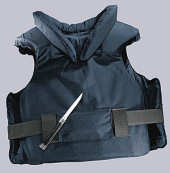 The Bureau of Industry and Security (“BIS”) recently released an advisory opinion stating that stab vests are classified under ECCN 1A005. That ECCN controls “body armor … not manufactured to military standards or specifications.”
The Bureau of Industry and Security (“BIS”) recently released an advisory opinion stating that stab vests are classified under ECCN 1A005. That ECCN controls “body armor … not manufactured to military standards or specifications.”
According to that advisory opinion:
ECCN 1A005 does not set a minimum level of protection that body armor must provide to be controlled. It does specify in the Related Controls section that body armor meeting NIJ protection levels III and IV are subject to the licensing authority of the Department of State. Therefore, the U.S. Department of Commerce considers body armor that does not meet the State Department criteria, but that provides protection to the wearer against nonballistic threats, such as stabbing weapons, to be a classified commodity under ECCN 1A005.
This is an oddly-broad argument that would arguably classify as ECCN 1A005 an umpire’s vest or any other garment that provides any level of protection against any threat of bodily injury.
More significantly, BIS’s analysis should have taken into account whether a stab vest poses any concerns with respect to the reasons for control stated for items classified under ECCN 1A005, namely national security and anti-terrorism. If the U.S. military were using knives to attack terrorists and foreign enemies, then there might be a reason to classify stab vests under ECCN 1A005. But last time I checked, our military was using, for obvious reasons, guns and other weapons against which a stab vest affords not a single ounce of protection.
The advisory opinion is also hard to reconcile with an explicit exception set forth in ECCN 1A005 and not discussed at all by the advisory opinion:
This entry does not control body armor designed to provide frontal protection only from both fragment and blast from non-military explosive devices.
This is clearly a reference to the bomb vests worn by law enforcement personnel who have the perilous job of defusing criminal explosive devices. Obviously, BIS felt that such vests aren’t of much use to foreign enemies and terrorists in defending themselves from our military, largely, I suppose, because only frontal protection is provided. But if such vests aren’t beneficial to those who would pose terrorism or national security threats, certainly stab vests are even less useful. (Frankly, a bomb vest such as described in the exception might be of some use to a terrorist engaged in making a bomb, whereas there appears to be little reason for a terrorist or an enemy soldier to wear a stab vest.)
The BIS ruling seems even less justifiable in light of the reason for the current increased demand for exports of stab vests. The growth market for stab vests is in the United Kingdom, where knife violence is reaching epic proportions and where local governments are ordering stab vests for certain at-risk “front-line” government employees, including “emergency room staff, hospital porters, teachers, social workers and parking enforcement officers.” Needless to say, there are plenty of non-U.S. sources for these vests, and this advisory opinion will simply unfairly disadvantage U.S. companies in meeting this legitimate need for the stab vests.

 Posted by
Posted by  Category:
Category: 


 The Office of Foreign Assets Control (“OFAC”)
The Office of Foreign Assets Control (“OFAC”) 
 According to the latest civil penalty information
According to the latest civil penalty information 

